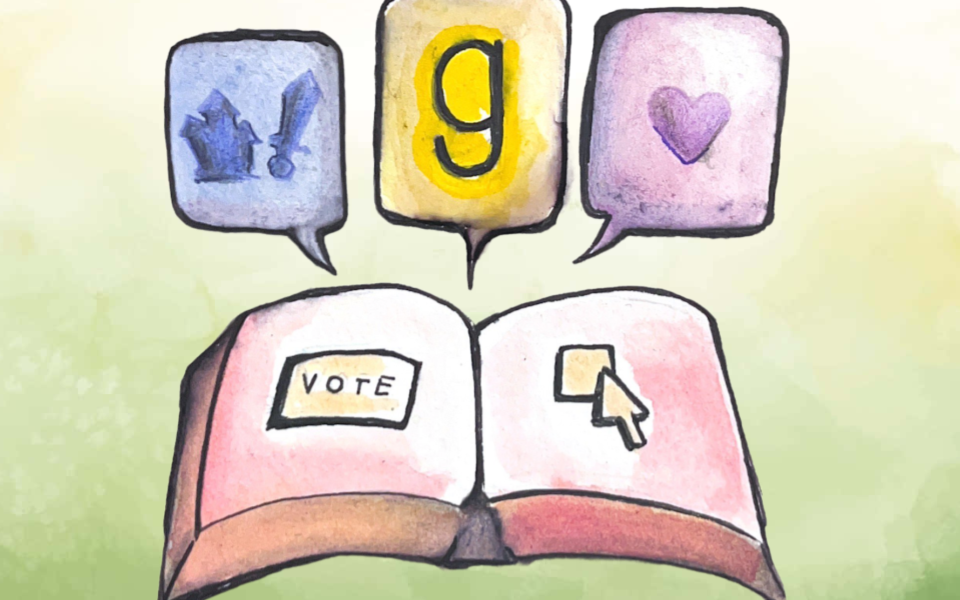Most people have heard of the Grammys and the Oscars, but unless you’re an avid reader, the Goodreads Choice Awards may be less well-known. Goodreads is a social media platform dedicated to books and those who read them. Since 2009, the website has hosted its annual Choice Awards, allowing users to vote on their favourite reads of the year. To qualify, the selected books must have been published within the voting year in the United States in English—although books in translation are included—and have an average rating between 3.50 and 5.00 stars. Voting happens in two rounds, opening with 20 books and cutting down to 10 in the final. This year, the voting started on Nov. 14, and the final winners will be revealed on Dec. 7.
While I don’t always vote in every category, I still search through the nominees for titles to add to my ever-growing, overly optimistic to-read list. The categories usually encompass a variety of genres, from Historical Fiction to Horror, appealing to readers across the board. However, in an update on Nov. 12, Goodreads announced that their categories would be adjusted.
Goodreads introduced the category of “Romantasy,” a subgenre of Fantasy with a prominent romantic subplot. This addition seems unnecessary given the pre-existing categories of Fantasy, Romance, and Young Adult Fantasy. However, the logic behind this decision makes sense. Romance and Romantasy have become especially popular on BookTok, a niche literary community on TikTok. Romantasy books typically follow Fantasy conventions but have simpler world-building—unlike many high fantasy novels—and a greater emphasis on romance, which contributes to their growing appeal.
Goodreads also decided to remove three categories: Children’s and Middle-Grade Fiction, Poetry, and Graphic Novels. This change has sparked outrage and confusion online, especially because these categories have suffered from low book sales in recent years. Additionally, recent reports reveal that kids in North America are reading less for pleasure, accompanied by a decrease in their reading scores, causing concern among publishers and librarians.
People have taken to X (formerly Twitter) to voice their frustrations. User pagesofhayley writes: “Removing children’s/middle grade from the goodreads choice awards is making sure a whole age group for books won’t get visibility now.” Jnetalee says: “In a year where #kidlit is really struggling with book bans, you decide to eliminate middle grade, children’s, and graphic novels from the awards categories?”
These responses are justified, given that internet trends have increasingly influenced the literary world, making it harder for less popular genres to break into the mainstream. Removing categories geared toward young readers reduces the visibility of both authors and books. As a form that encourages self-expression, Poetry’s removal is also very concerning.
Faye Bender of The Book Group, a literary agency, posted a petition on Nov. 17 requesting Goodreads to reinstate Children’s and Middle Grade and Graphic Novels. The petition states, “If we don’t encourage and support younger readers by bolstering the visibility of books written and published for them, who will grow up to read adult books?”
Goodreads has also been criticized in recent years for awarding predominantly white authors. Unfortunately, the stories themselves are similarly lacking in diversity: this year’s Romance lineup—one of the most popular genres—is remarkably lacking in Black and Indigenous voices, writers of colour, and 2SLGBTQIA+ stories. This issue carries over from the predominantly white publishing industry, where a lack of diversity persists from hiring to acquisitions.
Goodreads influences what works readers are exposed to, and thus, what gets published. Last year’s Goodreads Awards saw over 5.7 million votes cast. By neglecting to highlight marginalized authors and underrepresented genres, the platform prevents them from getting the exposure they need to thrive. The industry has always been demand-driven, so if people express a desire for inclusivity, we can hope publishers will circulate more diverse works. If you’re looking to diversify your reading list in 2024, instead, start with these lists from Little Free Library, or ask your friends for their recommendations. The Goodreads awards should not be your place to start.








